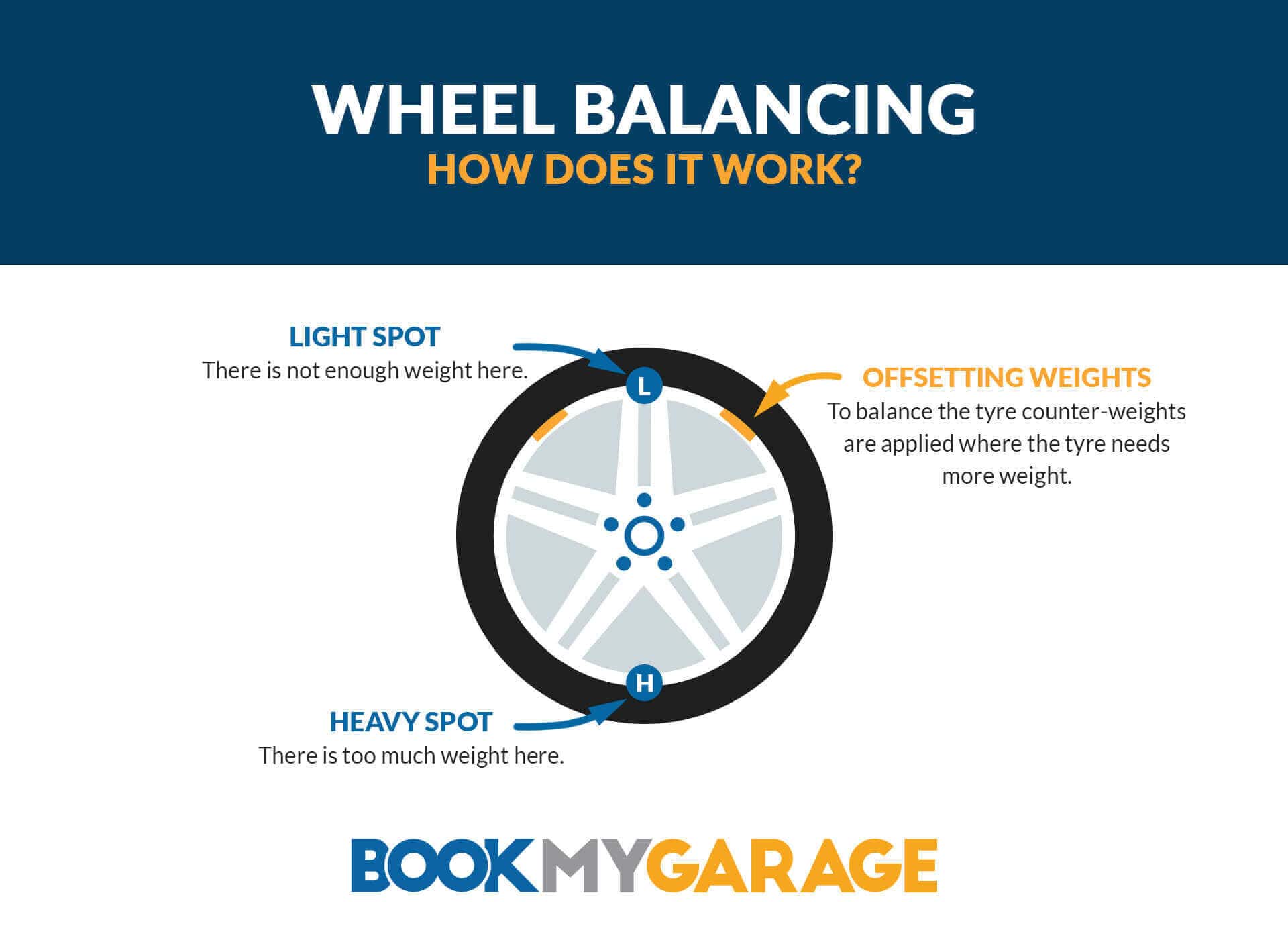Along with wheel alignment, wheel balancing is an essential aspect of car maintenance which you need to invest in.
When your wheels are properly balanced, you can enjoy a smoother ride, improve the lifespan of your tyres, and even increase fuel efficiency.
Read on and find out what wheel balancing is, and why it is so important for your vehicle.
Page Contents
- What is Wheel Balancing?
- Why is It Important?
- How Long Can You Drive on Unbalanced Tyres?
- Does My Car Need a Wheel Balancing Service?
- What Happens During a Wheel Balancing Service?
- How Long Does It Take?
- How Much Does Wheel Balancing Cost? (UK)
- When Should I Have My Wheels Balanced?
- What Causes Unbalanced Wheels?
- What Happens If You Delay a Wheel Balancing Service?
What is Wheel Balancing?
Wheel balancing is a process in which small weights are attached to the wheel’s rim to distribute the weight of the wheels evenly across each axle.
When a wheel rotates the full circumference of the tyre, it should stay in contact with the road and wear evenly if the wheels are balanced correctly.
Why is It Important?
Whilst your car’s wheels and tyres will never be perfectly balanced, this process is still incredibly important.
Your tyres will naturally wear over time, but they may also have imperfections from the manufacturer. Imperfections like these can pose problems when the vehicle is travelling at speed, as any weight imbalances can cause the wheel and tyre assembly to spin less smoothly.
Uneven tyre wear caused by wheels that aren’t balanced correctly can lead to an uncomfortable ride and pose serious safety concerns.
You will likely notice vibrations or shaking through the steering wheel and chassis if your wheels aren’t properly balanced.
This can make it difficult to focus whilst driving, and you could find that your vehicle’s handling and stability is impacted when you need it most.
How Long Can You Drive on Unbalanced Tyres?
If you think that your tyres are unbalanced, then you should have your wheels checked as soon as possible.
Whether or not you notice any warning signs, it is important that you have your wheels and tyres looked at by a mechanic on a regular basis.
As your tyres wear out with use, the composition of the tyre on a wheel can change as the tread wears down, or if you hit the kerb or drive over a pothole.
This can also have a negative impact on your suspension system and wheel bearings, which can in turn lead to poor fuel economy.
That’s why it is so important that you book your car in for wheel balancing if you are at all concerned about your wheels or tyres.
Does My Car Need a Wheel Balancing Service?
Your vehicle’s wheels may need to be balanced if you notice any of the following warning signs:
- Vibrations in the steering wheel
- Uneven tyre tread wear
- Steering issues
- Bad shock absorbers
- Bad wheel bearings
- Poor fuel economy
Any of these issues could signal that there is a problem with your wheels which needs to be addressed by a professional mechanic.
You may also notice strange noises whilst driving, or that the back of your car ‘fishtails’ on certain corners.
What Happens During a Wheel Balancing Service?
During a wheel balancing service, the wheels are removed from the car and loaded onto a balancing machine. This machine will spin the wheel to determine where the weights should be placed to correct any imbalance.

How Long Does It Take?
Car wheel balancing usually takes between 30 and 40 minutes to complete.
The time can vary depending on the age of your wheels, and how many of them require balancing.
Older tyres will take longer to balance as they are likely to have experienced extra wear and tear.
How Much Does Wheel Balancing Cost? (UK)
In the UK, wheel balancing can cost roughly £5 to £10 per wheel – though the price can vary depending on the type of car you drive.
You can book wheel alignment and wheel balancing together, in which case most garages add up the wheel balancing fees to the wheel alignment.
When Should I Have My Wheels Balanced?
If you are planning on having new tyres fitted or rotated, or you wish to swap your summer tyres for winter ones, then it is a good idea to have your wheels balanced at these intervals.
Check your vehicle’s handbook if you are at all uncertain, but generally speaking you should have your wheels balanced every 2 years or 5000 miles.
You may wish to book in for wheel balancing earlier if you suspect that you have driven over a pothole or kerb.
Book in for professional wheel balancing and prolong the lifespan of your tyres today.
What Causes Unbalanced Wheels?
Wheels can easily become unbalanced if the car is driven over a rough road surface.
The vibration from the road can cause the weights on your wheels to shift and become unbalanced.
If you drive over a pothole or kerb, then the wheel can bend and become unbalanced.
What Happens If You Delay a Wheel Balancing Service?
If you don’t have your wheels properly balanced when needed, this could negatively impact other components of your vehicle.
Incorrectly balanced wheels can add pressure to wheel bearings, and make shock absorbers less efficient.
Poor fuel economy can be attributed to the fact that more power will be required if your wheels are rotating unevenly, which can lead to an increase in fuel consumption.
What’s more, unbalanced wheels can make for an uncomfortable driving experience, with worse handling, braking, and reduced grip.
That’s why it is so important that you book a wheel balancing service if you are at all concerned about your car’s wheels.
We hope you have enjoyed learning about the importance of wheel balancing.








No comments yet
Leave a comment